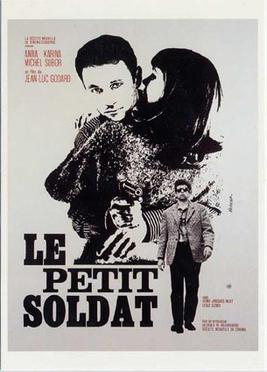
Le Petit Soldat, 1960
Dir: Jean-Luc Godard
June 10, 2009
Netflix Wakefield MA
Godard's second feature is about an a disenchanted hitman, Bruno (Michel Subor), living in Geneva to avoid enlistment in the Algerian War. Working for French intelligence, he is ordered to kill a pro-Algerian to prove he is not a double agent. Meanwhile, he meets and falls in love with Veronica Dreyer (Anna Karina), who has been helping the Algerians. Bruno plans to leave with her for Brazil, but before he can he is is captured and tortured by Algerian revolutionaries. He escapes, and agrees to kill the man he was supposed to in the first place in exchange for passage to Brazil for him and Veronica. However, the French discover Veronica's ties to the Algerians, and torture her to death. Before he realizes she is dead, Bruno kills the man.
Le Petit Soldat (The Little Soldier) caused a sensation when it was released for its realistic portrayal of torture. It was even banned in France until the war was over, which was three years later in 1963. In itself, it is pretty effective in the movie, though it isn't that gratuitous overall (only in comparison to what you can see today).
The film has the typical Godard style, which is nice for the most part, despite a few sloppy parts that were really jarring. The one thing about the film that I didn't like was the whole inner monologue thing that Bruno had going on. He'd say something like "I don't know why she turned away.", and then Veronica would turn away. I can see it for myself dingle. There's also the whole "I'm a hitman, but I'd rather think about art and classical music" stigma that must be really hard for Bruno to handle. It can be a bit overbearing at times, but that's just Godard speaking through the character obviously. What the style does establish is the something that Godard uses throughout his career, which Bruno verbalizes when he says: "Photography is truth, and cinema is truth 24 times per second." This is just another statement about the ruminations that Godard has about the nature of cinema.
The film overall is pretty interesting, though clearly not Godard's best. The Algerian War itself is something that I know little about, and it was nice to learn some stuff about it. About the DVD, there were a few parts, especially when Bruno isn't thinking or talking and just observing some people, where the subtitles fall off, so there were a few parts where I was guessing what was going on.
I think my overall feelings for Godard are starting to change to just that he has his place in the French New Wave revolution that changed cinema, but he really isn't one of my favorites. I'll just have to see how that progresses.
No comments:
Post a Comment